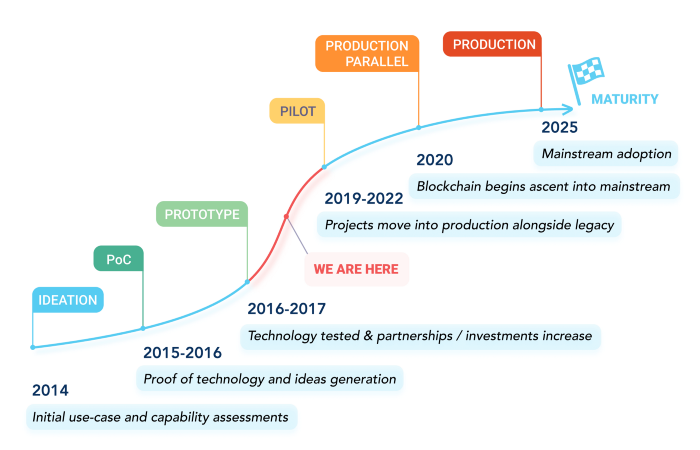This article was written by Matteo Gianpietro Zago.
When talking about blockchains, we commonly think of its applications in the future. “Blockchain will solve this, blockchain will achieve that”. It’s easy to forget that blockchains are already deployed in the wild.
Pick an industry, from automobiles to artificial intelligence, and odds are you’ll find examples of blockchains in action. In all quarters and all circles, blockchains are making their mark. Even the US Treasury is in on the act, advocating for more pilot projects and test programs.
The ‘World Economic Forum’ anticipates that 10% of global GDP will be stored on the blockchain by 2025. That means the global executives out there are preparing for this seismic shift, and are ready to completely back its implementation. The impact of distributed ledger technology could be as grand as the internet revolution itself.
The use cases differ, but the benefits derived from using the technology remain unchanged: transparency, immutability, redundancy and security.In 2018, new blockchain initiatives are launched every day. Here are 50 examples of blockchains in use around the globe.
Government
A number of governments have expressed an interest in blockchain technology to store public records on a decentralized data management framework. Essentia is developing an e-government pilot with Finland’s Central Union of Agricultural Producers and Forest Owners. Blockchain will enable urban and rural citizens throughout Finland to access records.Other use cases include government applications such as education, public records and voting.
Waste Management
Waltonchain’s RFID technology is being used by a Smart Waste Management System in China. Using Walton’s blockchain, the project will enable supervision of waste levels to improve operational efficiencies and optimize resources.
Identification
Zug in Switzerland, known as “Crypto Valley” has developed a blockchain project in partnership with Uport to register residents’ IDs, enabling them to participate in online voting and prove their residency.
Border Control
Essentia has been meeting with the Dutch government to create a new system for vetting passengers traveling between Amsterdam and London. At present, passengers on the Eurostar train between the two countries undergo border control checks at multiple points. Essentia is studying a blockchain-based solution that would securely store passenger data, enabling the metrics recorded in the Netherlands to be audited by agencies in the UK. Blockchain would provide a means of ensuring that the data has not been tampered with and is verifiably accurate.
Healthcare
Medical records are notoriously scattered and erroneous, with inconsistent data handling processes meaning hospitals and clinics are often forced to work with incorrect or incomplete patient records. Healthcare projects such as MedRec are using the blockchain as a means of facilitating data sharing while providing authentication and maintaining confidentiality.
Enterprise
Clients of Microsoft Azure Enterprise can access the Ethereum Blockchain as a Service. This provides businesses with access to smart contracts and blockchain applications in a secure hosted environment.
Google is also reported to be working on a proprietary blockchain to support its cloud-based business. Parent company Alphabet is developing a distributed ledger that third parties will be able to use to store data, believed to be in regards to Google’s cloud services for enterprises, with a white label version for companies also in the works.
Medical
Medical centers that have digitized their patient records don’t distribute their data across multiple facilities, instead keeping them on-site on centralized servers. These are a prime target for hackers, as evidenced by the ransomware attacks that struck NHS hospitals in the UK. Even if security risks are overlooked, there is still the problem of fragmentation. There are currently more than 50 different electronic healthcare record (eHR) software systems that operate in different hospitals, often with dozens of different packages within the same city. These centralized systems do not interoperate with one other and patient data ends up scattered between disparate centers.
In life-and-death settings, the lack of reliable data and sluggish interfaces may prove devastating. The Essentia framework addresses all these issues by using a blockchain-powered system that will store clinically relevant patient data and which can be immediately accessed, regardless of geographical borders. Patient privacy is maintained on a secure decentralized network where access is granted to only those who are medically authorized and only for the duration needed.
Music
One of the main benefits of blockchain technology is the way it removes intermediaries or middlemen. The music business is a prime example of an industry whose inefficiencies have seen artists poorly remunerated for their efforts. A number of blockchain-based projects have sprung up seeking a fairer deal for music creators, including Artbit, overseen by former Guns N Roses drummer Matt Sorum.
To read the rest of the article, click here.

